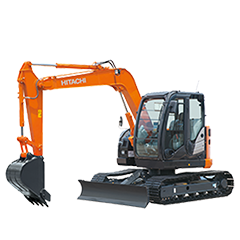1. Issue
In principle, a color trademark is not considered inherently distinctive; however, it may be registered as long as the color alone is recognized among consumers of the designated goods or services as a source identifier of a certain party through the use of the color (the so-called "secondary meaning" or "acquired distinctiveness"). The main issue in the subject case was whether a single "orange" color trademark had acquired distinctiveness through the use of the color by the Plaintiff.
Subject Mark:

Designated Goods: "Hydraulic excavators" in Class 7.
An example of the Plaintiff's goods from their website:

2. The IP High Court's Ruling
The IP High Court held that the following matters should be taken into consideration comprehensively in judging whether a single color has acquired distinctiveness through the use:
- Facts of use, e.g., (i) the period and area where the mark has been used, (ii) the amount of sales of the goods, the scale of operation, and (iii) the period and scale of advertisement;
3. Findings and Discussion
(1) Sales of "Hydraulic Excavators" Bearing the Subject Mark
- The Plaintiff has sold "hydraulic excavators" bearing the subject mark for about fifty years. In addition, the Plaintiff's share of "hydraulic excavators" excluding "mini-excavators" are about 20% and those of "mini-excavators" are about 10%. The sales volume of "hydraulic excavators" and "mini-excavators" are thousands per year, respectively.
- Also, the subject mark is used in combination with a famous mark "HITACHI" or "HITACHI in Kanji" and/or other colors in connection with "hydraulic excavators," and the "orange" color being the subject mark per se is not recognized as the source identifier of "hydraulic excavators".
(2) The Plaintiff's Advertisements
- Also, the "orange" color in some of the Plaintiff's advertisement is used as a "design", but not used in relation to "hydraulic excavators." Such advertisements may give the impression that the "orange" color is the Plaintiff's "corporate color" and it may have some recognition among consumers, but the color has a weak connection with the "goods." So, it is difficult to say that the subject mark has been well known as indicating the source of the Plaintiff's "hydraulic excavators."
(3) The Result of Questionnaire
- The questionnaire the Plaintiff submitted targeted traders and consumers of "hydraulic excavators" in Japan; however, consumers in the fields of wheel loaders, dump trucks, road machines, environmental machines, agriculture or dairy products were excluded from the target. Also, the target was limited to those who owned 10 or more "hydraulic excavators." In addition, the number of valid answers was just 193 out of 502 (the number of the target). Although the Plaintiff says that the recognition rate is 95.9%, this is against the number of valid answers. If this is against the number of the target, it is just 36.8%.
- The question asked when the color being the subject mark was presented was: Which maker's "hydraulic excavators" is this? Such question is based on the assumption that the subject mark is recognized as the source identifier. Therefore, it is difficult to tell by the answers whether the subject mark is recognized as the Plaintiff's source identifier only or it is just recognized as the body color of the Plaintiff's "hydraulic excavators." In view of these, the result of the questionnaire does not strongly support that the subject mark has been well known as the Plaintiff's source identifier.
(4) Other Parties' Use of Similar Colors
- The "orange" color has been adopted and used by many other parties in the field of construction machinery which has the same consumers as "hydraulic excavators," and in the fields of agricultural and forestry machines where "hydraulic excavators" are applied. In the situations, it cannot be said that the Plaintiff has exclusively used the color being the subject mark for "hydraulic excavators" even though the Plaintiff has sold "hydraulic excavators" using the color for a long time.
(5) Actual Situations Where "Hydraulic Excavators" Are Traded
- "Hydraulic excavators" are a kind of construction machines and used in the fields of agriculture and forestry as well as construction. Some companies manufacture or market both construction machines including "hydraulic excavators" and agricultural machines. Construction machines including "hydraulic excavators" are relatively expensive, so traders or consumers select them, looking to the function or reliability of the goods and checking the makers. As such, the color of the goods does not play a large role when the goods are selected and purchased.
- Even though 90% of the domestic market share of "hydraulic excavators" are occupied by 5 companies (including the Plaintiff) and the "orange" color has been used by the Plaintiff only, there are still some other companies including foreign companies which have used "orange" colors.
4. Conclusion
In view of the above, the IP High Court affirms the JPO Appeal Board's decision that the subject mark should not be registered because it has not acquired distinctiveness through the use of the color by the Plaintiff.
5. Practical Tips
In Japan, it is very hard to register a color mark. Only 8 color marks have been registered since 2014 (when it was newly introduced under the Trademark Law); however, there are no "single color" mark registrations. To enhance the registrability, it may be a practical option to try to apply for registration of a mark consisting of 2 or more colors.


